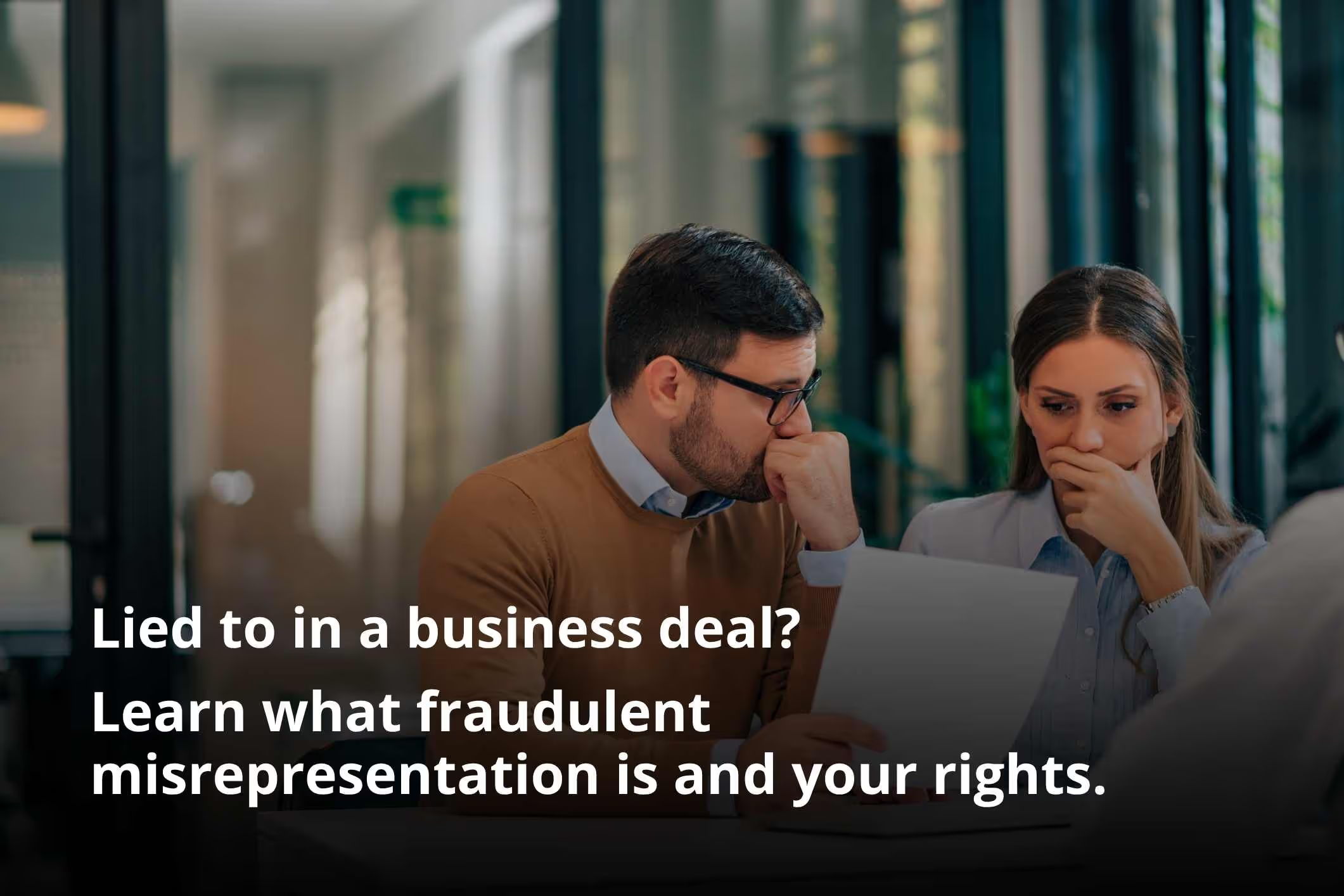A signed contract should mark the beginning of a profitable partnership, not the start of a costly legal battle. Yet California businesses are regularly deceived by vendors who lie about their capabilities, partners who conceal critical information, or competitors who make false claims to steal market share.

When someone deliberately lies to close a deal and those lies cost your business money, the law provides a remedy. Below, we explain what is fraudulent misrepresentation, the elements required to prove it, and the steps California businesses can take to recover losses caused by deception.
At Thorsnes Bartolotta McGuire, we've recovered millions for businesses damaged by fraud, breach of contract, and deceptive practices. Contact us at (619) 236-9363 to speak with a business litigation attorney about your case.
Understanding the Legal Standard for Fraudulent Misrepresentation
The fraudulent misrepresentation definition under California law is precise:
- Someone made a false statement about a material fact,
- Knew it was false,
- Intended for you to rely on it,
- You did rely on it, and
- That reliance caused you financial harm.
Each element matters. It's not enough that someone was wrong. They had to know they were lying or not care whether what they said was true. It's also not enough that they lied. You had to believe the lie and make a business decision because of it.
This distinction separates fraudulent misrepresentation from other false statements. If someone genuinely believed what they told you but was mistaken, that's negligent misrepresentation. If they made a vague, optimistic prediction that didn't pan out, that's failed expectations. But when they knowingly fed you false information to get your money or signature, that's fraud.
When False Statements Cross the Line Into Fraud
Not every false statement in business rises to the level of fraud. California courts distinguish between actionable misrepresentation and statements that don't create legal liability.
- Statements of fact versus opinions. If someone says, "This is the best product on the market," that's a subjective opinion and not actionable. But if they say "This product has been certified by the FDA" when it hasn't been, that's a false statement of fact.
- Material versus trivial details. The false statement must matter. A vendor lying about their company logo color isn't material to your decision, but lying about insurance coverage or the origin of their materials likely influenced your choice.
- Active concealment and silence: Fraud isn't always about what someone says but what they deliberately hide. When a party has a duty to disclose information, like known product defects or existing property liens, and stays silent, that constitutes fraudulent misrepresentation, especially when one side has insider information and exploits it.
The common thread is deception with intent. Someone chose to mislead you, knew you'd rely on that false information, and proceeded anyway because it served their interests.
Real Situations Where Businesses Face Fraudulent Misrepresentation
Fraud becomes easier to identify when you see how it plays out in actual business transactions. The following fraudulent misrepresentation examples show common deception patterns California companies face and the financial damage that follows.
The Vendor Who Fabricated Credentials
A San Diego tech company hires a cybersecurity firm claiming specific industry certifications and Fortune 500 experience. After a data breach, the company discovers the firm never held any certifications and fabricated its client list, resulting in regulatory fines, lost customer trust, and costly remediation.
The Partnership Built on False Financials
Two companies explore a joint venture. One provides financial records showing consistent growth and healthy margins. After the partnership launches, auditors discover the statements were falsified with inflated revenue and hidden expenses. The deceived partner faces unexpected liabilities.
The Supplier Who Misrepresented Capacity
A manufacturer awards an exclusive contract to a supplier who assures them they can meet volume and deadline requirements. When production ramps up, the supplier can't deliver. Internal emails reveal they knew from the start they couldn't meet capacity but lied to secure the contract.
The Acquisition Concealing Environmental Problems
A company purchases commercial property based on environmental reports showing it's clean. After closing, they discover soil contamination that will cost millions to remediate. The seller had commissioned a second report documenting the contamination, but never disclosed it.
These situations share a pattern: someone with knowledge intentionally misled another party for advantage, and that deception caused real financial harm.
How to Prove Fraudulent Misrepresentation
Suspecting fraud and proving it legally are different things. California courts require clear evidence for each element, and the burden of proof is higher than in standard contract disputes.
You must establish five elements:
- A false representation was made. Show exactly what was said or written, when, and why it was untrue. Written evidence, such as emails, contracts, and marketing materials, carries more weight than verbal statements.
- The person knew it was false. You must demonstrate they knew they were lying or had reckless disregard for the truth. Internal documents, employee emails, or evidence that they had access to accurate information they ignored can establish this knowledge.
- The statement was made to induce reliance. The false statement must have been made to get you to sign a contract, make a payment, or enter a partnership. If someone lied about something unrelated to the transaction, it's not fraudulent misrepresentation.
- You actually relied on it. Did you believe them, and did that belief influence your decision? If you had contradicting knowledge or would have proceeded regardless, this element fails.
- Your reliance caused harm. Show financial damage that directly resulted from believing the lie. Courts want a clear connection between the false statement, your decision, and measurable losses.
Evidence that strengthens your case:
- Documentation showing promised versus delivered results,
- Email trails demonstrating the other party's knowledge,
- Financial records quantifying losses, and
- Proof of reasonable due diligence that couldn't uncover the truth.
Thorsnes Bartolotta McGuire investigates fraud claims thoroughly, gathering the documentation and testimony needed to prove each element. If your business has been damaged by intentional deception, call us at (619) 236-9363 to discuss your options.
What Damages Can California Businesses Recover?
Fraudulent misrepresentation claims allow for several types of compensation.
- Compensatory damages cover direct financial losses, such as money paid due to false statements, lost profits, and costs to fix problems the fraud caused. If you bought defective equipment based on lies, this covers purchase price, repair costs, and lost business.
- Consequential damages cover indirect losses such as lost opportunities, damaged customer relationships, and reputational harm if you can show they resulted from the fraud.
- Punitive damages punish particularly malicious or oppressive conduct and deter similar behavior. Courts award these when fraud was deliberate, calculated, and showed conscious disregard for your rights.
- Rescission undoes the transaction entirely. Instead of collecting damages, the court cancels the agreement and returns both parties to their original positions. This makes sense when fraud was so fundamental that the entire deal should be voided.
Why Fraudulent Misrepresentation Claims Require Legal Experience
Fraud cases are complex. They require more evidence, higher burdens of proof, and more sophisticated legal arguments than standard contract disputes. That's why businesses turn to experienced litigation attorneys when they've been deceived.
Attorneys use discovery tools like depositions, subpoenas, and document requests to uncover evidence the other party doesn't want disclosed. They know California's strict pleading standards, understand how to create settlement leverage, and can identify damage categories you might not have considered.
Legal counsel also protects against counterclaims and manages the litigation timeline that can take months or years. For California businesses, pursuing a fraud claim requires legal experience and resources to see the case through.
Thorsnes Bartolotta McGuire Holds Businesses Accountable for Fraud
For over four decades, Thorsnes Bartolotta McGuire has represented California businesses in complex fraud and contract disputes, securing verdicts and settlements totaling over $2 billion.
Fraudulent misrepresentation cases demand thorough investigation, aggressive advocacy, and a willingness to take cases to trial when settlement offers don't reflect the full extent of losses. Our firm brings that approach to every client.
Whether you're dealing with false statements in contract negotiations, concealment of material facts in business transactions, or outright lies that cost your company revenue, we build cases that prove fraud and pursue maximum recovery.
If your business has been damaged by fraudulent misrepresentation, contact Thorsnes Bartolotta McGuire at (619) 236-9363 or schedule a consultation online with a business litigation attorney today.





